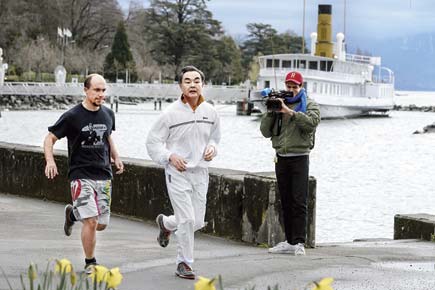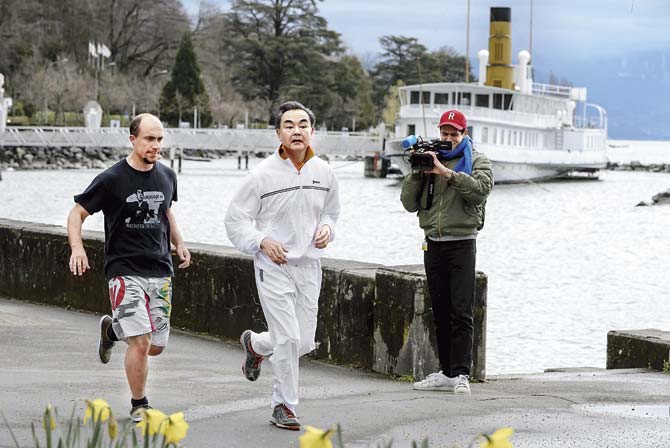The turmoil in West Asia seems to have no end and if it does have an end, the frontiers of the entire region will look different from the way it was configured by the victorious imperial powers after the First World War and controlled after the Second World War by the Americans

 The turmoil in West Asia seems to have no end and if it does have an end, the frontiers of the entire region will look different from the way it was configured by the victorious imperial powers after the First World War and controlled after the Second World War by the Americans. For decades after the Second World War, the interplay of regional ambitions and superpower interests complicated the situation. Meanwhile, very quietly and unobtrusively, the Chinese have begun to arrive.
The turmoil in West Asia seems to have no end and if it does have an end, the frontiers of the entire region will look different from the way it was configured by the victorious imperial powers after the First World War and controlled after the Second World War by the Americans. For decades after the Second World War, the interplay of regional ambitions and superpower interests complicated the situation. Meanwhile, very quietly and unobtrusively, the Chinese have begun to arrive.

Chinese Foreign Minister Wang Yi (centre) jogs along Lake Geneva during the Iran nuclear talks. China views Iran as a strong West Asian power and a suitable candidate for Chinese friendship in the context of US hostility. Regardless of what happens with the nuclear deal, China is not expected to revert to the previous scale of sanctions and will continue to strengthen its military ties. Pic/AFP
While West Asia is volatile, the Chinese are beginning to get more active in Afghanistan, retain their pre-eminence in Pakistan and strengthen ties with Iran. The Chinese see a weakening US footprint in Afghanistan, its unpopularity with the regime in Iran and with the average Pakistani. The Chinese are obviously making preparations for the time when peace returns to the Arab world, which might leave a stronger Iran. They will most probably follow Deng’s advice and keep a low profile for some time but some Chinese sense that their moment has come.
The mutually beneficial China-Pakistan arrangement will continue to grow. The Chinese promised to invest about US$45 billion in November 2014 mostly in infrastructure and energy sectors. A four-lane road from Hazara town passes close to Islamabad linking to the Karakoram Highway. China will improve the Karakoram Highway and build an airport in Gwadar. There was an earlier significant agreement to set up a fibre-optic cable from the Chinese border to Pakistan’s military headquarters, Rawalpindi. China is expected to concentrate on infrastructure development of the Gilgit-Baltistan area. This along with Gwadar provides a vital link to Kashgar in Xinjiang. The Chinese will continue to help Pakistan in many spheres but they can be expected to carefully nuance their relationship. Pakistan hoped that President Xi Ping would attend the Pakistan Day parade because Obama had come to India but the Chinese were unwilling to play one-upmanship with the US.
However, it is in Balochistan that the Chinese and the Pakistan government face the most problems from Baloch nationalists demanding independence and their share of the resources and opposed to Chinese presence. It is this uncertainty that seems to unsettle the Chinese. Moreover, the fear of activities by Islamic radicals and Uighurs in Xinjiang with their Pakistani connection has made the Chinese wary. The suicide attack in February in Xinjiang only heightened Beijing’s concerns.
Moreover, the growing profile of the Taliban has led to a rethink and Beijing has given up its indifference to events in Afghanistan. China announced a grant of US$ 500 million to Afghanistan apart from investing more than US$ 3 billion in developing Afghan oil and copper reserves. Afghan Taliban officials are believed to have secretly visited China and the Chinese publicly expressed interest in mediating between them and the Afghan government. Despite this, or maybe because of this, Afghan President Ashraf Ghani also visited Beijing on his first state visit in October 2014. Ghani will visit India only in April, marking a change in priorities in Kabul. Afghanistan is an important part of the Chinese Silk Road Economic Belt connecting to Central Asia. Pakistan would hope that China would get more involved in Afghanistan’s economic development after the US departure and the Indian presence in Afghanistan would thus be reduced.
Iran is the third leg of China’s policy in our immediate western neighbourhood. China views Iran as a strong West Asian power and a suitable candidate for Chinese friendship in the context of US hostility. Iran is of immense geostrategic importance to China. A vital source of energy (imports up 28% in 2014) Iran is also an important link in the Silk Road from Central Asia into northern Iran before reaching out through Iraq, Syria and Turkey. China is Iran’s largest trading partner and has supported Iran despite US sanctions. There has been Chinese investment in mining, transport, and power generation. Regardless of what happens with the nuclear deal, China is not expected to revert to the previous scale of sanctions and will continue to strengthen its military ties.
China’s footprint to our west will continue to grow bigger as it seeks access to the waters of the Arabian Sea through Pakistan, the energy resources of Iran and the mineral resources of Afghanistan along with an access to the Persian Gulf both through Iran (via Afghanistan) and Pakistan.
As the stage is being set for new games and new players from Central Asia to the Indian Ocean, China seeks to hold vantage positions.
The writer is a former chief of Research and Analysis Wing (RAW)
 Subscribe today by clicking the link and stay updated with the latest news!" Click here!
Subscribe today by clicking the link and stay updated with the latest news!" Click here!







